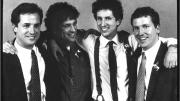In The Big House, George Howe Colt ’76 mined family memory in a bestselling portrait of a beloved summer home. Now, in Brothers: On His Brothers and Brothers in History (Scribner, $30), Colt explores his life in relation to siblings Harry, Ned, and Mark (the dedicatees), with interwoven historical pairings (Edwin and John Wilkes Booth, Vincent and Theo van Gogh, etc.). Here is a vivid taste of the personal passages, from the book’s beginning:
If the handful of black-and-white snapshots that remain from my childhood is any indication, it’s a wonder I didn’t end up with a permanent crick in my neck from literally and figuratively looking up to my older brother. Harry was born 20 months before me, and I worshiped him with an intensity that must have been both flattering and bewildering to the worshipee. I didn’t want to be like Harry; I wanted to be Harry. I cocked my coonskin cap exactly the way he did when we played Daniel Boone; I made the same pshew-pshew sounds he did when I pulled the trigger on my silver plastic six-shooter; I punched the pocket of my baseball glove every time he punched his. When he woke me in the middle of the night one Christmas Eve and invited me downstairs to open presents while our parents slept, I followed. When he said he could help me get rid of my loose tooth, I let him tie it to the playroom doorknob and slam the door. He was my older brother and I would have agreed to anything he proposed; I would have followed him anywhere. And so, one spring evening not long before I turned six, as we lay in our matching twin beds, when Harry suggested that we run away from home, I said yes.
The following morning before dawn, I woke to find him standing next to my bed in his pajamas, clutching to his chest the gray metal strongbox in which he kept his baseball cards. I tiptoed behind him down the back stairs, through the kitchen, and into the garage. Harry opened the front door to the old blue Ford, climbed in, and shimmied over to the driver’s seat. I scrambled up next to him. We sat awhile in silence before he unlocked the strongbox and offered me some of the saltines with which he had filled it the night before. (To make room, he had left behind all but his most precious Red Sox cards.) We chewed our crackers and stared through the windshield at the closed garage door. I don’t remember what we said, or indeed whether we said anything at all. I don’t remember wondering where, if anywhere, we were going, or how far we could get in our pajamas, or what we would eat when the saltines ran out. I certainly didn’t ask my brother. Because I believed Harry could do anything, I wouldn’t have been surprised if the car had somehow started, the garage door had opened, and we’d sailed off down Village Avenue, our quiet, tree-lined street in suburban Boston, and into the sky.








